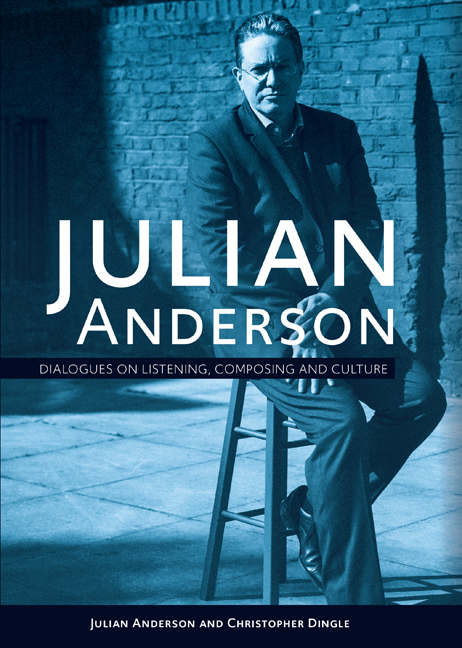Book contents
- Frontmatter
- Contents
- List of Illustrations
- Foreword
- Acknowledgements
- Introduction
- Prelude – Jeux: A Conversation Over Lunch
- Conversation One Origins
- Conversation Two Enthusiasms
- Conversation Three Training
- Conversation Four Dance
- Conversation Five Folk
- Conversation Six Composing (or Not)
- Conversation Seven Understandings
- Conversation Eight Beginnings (and Endings)
- Conversation Nine Puzzles
- Conversation Ten Singing
- Conversation Eleven Olly
- Conversation Twelve Memory
- Conversation Thirteen Opera
- Conversation Fourteen Practices
- Conversation Fifteen Outsiders?
- Conversation Sixteen Quartets
- Conversation Seventeen Advocacy
- Conversation Eighteen Partnerships
- Coda: Multiple Choices
- Chronology
- List of Personae
- Glossary of Musical Terms
- Macrotonality
- Catalogue of Published Works by Julian Anderson
- List of Recordings of Julian Anderson’s Music
- Bibliography
- Discography
- Index
Conversation Two - Enthusiasms
Published online by Cambridge University Press: 16 September 2020
- Frontmatter
- Contents
- List of Illustrations
- Foreword
- Acknowledgements
- Introduction
- Prelude – Jeux: A Conversation Over Lunch
- Conversation One Origins
- Conversation Two Enthusiasms
- Conversation Three Training
- Conversation Four Dance
- Conversation Five Folk
- Conversation Six Composing (or Not)
- Conversation Seven Understandings
- Conversation Eight Beginnings (and Endings)
- Conversation Nine Puzzles
- Conversation Ten Singing
- Conversation Eleven Olly
- Conversation Twelve Memory
- Conversation Thirteen Opera
- Conversation Fourteen Practices
- Conversation Fifteen Outsiders?
- Conversation Sixteen Quartets
- Conversation Seventeen Advocacy
- Conversation Eighteen Partnerships
- Coda: Multiple Choices
- Chronology
- List of Personae
- Glossary of Musical Terms
- Macrotonality
- Catalogue of Published Works by Julian Anderson
- List of Recordings of Julian Anderson’s Music
- Bibliography
- Discography
- Index
Summary
This conversation starts with a look at some of Anderson's musical heroes, before moving on to a discussion of creative misreadings and alternative views of figures such as Webern and Stravinsky, along with the partiality inherent in narratives of musical history, the construction of canons and attempts at providing the complete works of certain composers. Along the way, we encounter Anderson's inadvertently incomplete childhood knowledge of The Rite of Spring, the differences between versions of Boulez's Le visage nuptial and the interaction between Boulez and Cage in the early 1950s.
CD: I wonder if you might tell me about who some of your musical heroes are?
JA: Just a short string of names would be Hildegard of Bingen, Dufay, Haydn. I’m pausing before saying Mozart because it's only specific areas of Mozart. Beethoven, Schubert, Mendelssohn, Schumann, Wagner. Then Debussy, Sibelius, Stravinsky, Janáček, Messiaen. Among Americans, Ives and Ruth Crawford Seeger. I’m assuming heroes are largely dead?
CD: Yes. It's probably politic for them to be dead.
JA: Well in that case, Carter and Boulez can now be added to the list.
CD: Hildegard was an extraordinary figure, and the music is really distinctive in relation to other things around then, judging by Christopher Page's pioneering recording with Gothic Voices.
JA: I heard the original BBC Radio 3 documentary broadcast by Chris Page in 1980. It made a deep impression on me. I knew some plainchant but I’d never heard anything remotely like these long, arching melodies in medieval music before. It struck me as very fresh, as did what was read out on the programme from her writings, her visions. I hadn't taped the programme so I worried that I’d never hear of either her or her music again. Then, to my surprise, a recording came out on Hyperion in 1982 with the same performers and the same title (A Feather on the Breath of God) as the radio programme, and it became a bestseller. I recalled the music very vividly – so much so that when I bought the recording I found I could remember some of the melodies note for note.
CD: Has this fed into your music?
JA: Not specifically. I’ve always wanted to write my music melodically – all my music's made from melody, really – but to date I’ve never quoted or paraphrased her melodies in any piece.
- Type
- Chapter
- Information
- Julian AndersonDialogues on Listening, Composing and Culture, pp. 26 - 50Publisher: Boydell & BrewerPrint publication year: 2020



